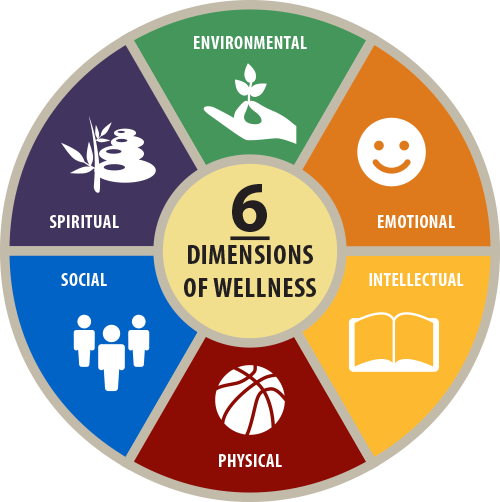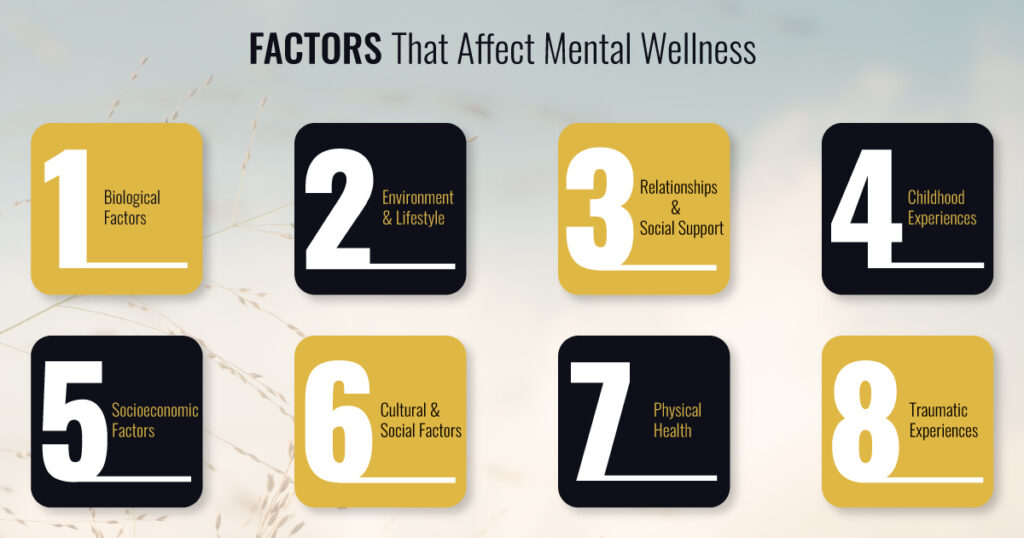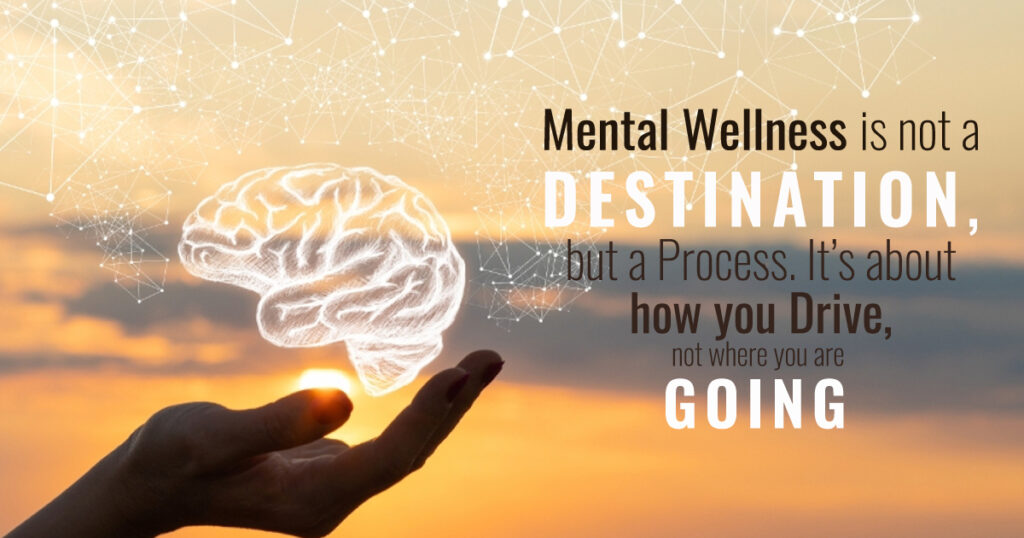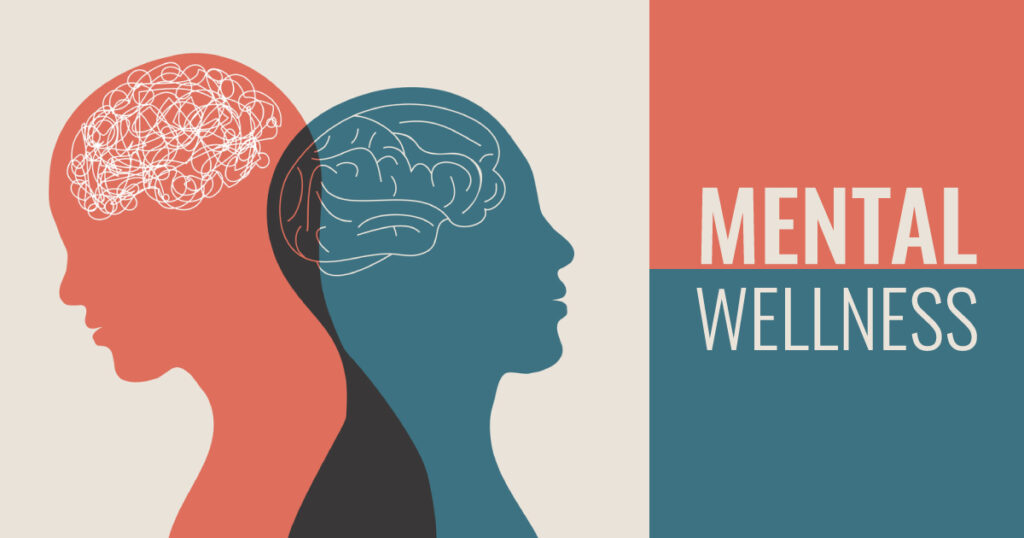What Is Mental Wellness?
What exactly is mental wellness? Our emotional, psychological, and social well-being all contribute to our mental wellbeing. It has an impact on how we think, feel, and act. It also influences how we deal with stress, interact with people, and make good decisions.
Mental wellness refers to a state of well-being in which an individual realizes their own abilities, can cope with the normal stresses of life, can work productively, and is able to contribute to their community. It encompasses emotional, psychological, and social well-being. Mental wellness is not merely the absence of mental illness but rather a positive state of functioning that allows individuals to thrive and experience a satisfying life.
Key aspects of mental wellness include:
- Emotional well-being: Being aware of and effectively managing one’s emotions, including both positive and negative feelings. It involves developing healthy coping mechanisms, emotional resilience, and self-awareness.
- Psychological well-being: Having a positive outlook, a sense of purpose, and a good level of self-esteem. It includes having a sense of personal autonomy and control over one’s life, as well as the ability to engage in meaningful relationships and activities.
- Social well-being: Maintaining healthy relationships and connections with others, fostering a sense of belonging and support. It involves effective communication, empathy, and the ability to establish and maintain boundaries in relationships.
- Cognitive well-being: Having a healthy thought process and the ability to think clearly and rationally. It includes being open to new ideas, being curious, and continuously learning and growing intellectually.
- Spiritual well-being: Nurturing a sense of purpose, meaning, and connection to something greater than oneself. It does not necessarily have to be related to religion but can encompass a broader understanding of the world and a personal sense of meaning and values.
Achieving and maintaining mental wellness involves taking proactive steps to care for one’s mental health, such as practicing self-care, managing stress, seeking support when needed, engaging in activities that promote well-being, and adopting a healthy lifestyle that includes proper nutrition, regular exercise, and sufficient sleep. It is a continuous process that requires ongoing attention and effort.

How does mental wellness differ from mental illness?
Mental wellness and mental illness are two distinct but interconnected concepts:
Mental Wellness: Mental wellness refers to a positive state of mental well-being in which individuals are able to function effectively, experience life satisfaction, and cope with the challenges and stresses of daily life. It involves having a sense of purpose, positive self-esteem, emotional resilience, and healthy relationships. Mental wellness encompasses various aspects of a person’s mental and emotional state, including their thoughts, feelings, and behaviors. It emphasizes a proactive approach to maintaining and promoting mental well-being through self-care practices and healthy lifestyle choices.
Mental Illness: Mental illness, on the other hand, refers to a wide range of diagnosable conditions that affect an individual’s thinking, emotions, behavior, or a combination of these. Mental illnesses can disrupt a person’s ability to function, impair their daily life activities, and cause significant distress. Examples of mental illnesses include depression, anxiety disorders, bipolar disorder, schizophrenia, and eating disorders, among others. Mental illnesses are typically diagnosed based on specific criteria outlined in diagnostic manuals, While mental wellness and mental illness are distinct concepts, they are interconnected. Mental wellness contributes to resilience and can help protect against the development of mental illness. On the other hand, experiencing mental illness can impact mental wellness and may require appropriate diagnosis, treatment, and support to alleviate symptoms and improve overall well-being.
It’s important to note that mental wellness exists on a continuum, ranging from optimal well-being to varying degrees of distress or impairment. Everyone experiences ups and downs in their mental well-being throughout their lives, and seeking support and appropriate care is essential in maintaining mental wellness and addressing mental health challenges when they arise.
Factors that affect mental wellbeing
Recognizing the various factors that affect mental well-being can help individuals to take care of themselves well.A person’s mental wellness is influenced by a range of circumstances, which can have either positive or negative consequences. Here are some important things that can have an impact:
- Biological Factors: Biological factors such as genetics and brain chemistry play a role in mental well-being. Some individuals may be more susceptible to certain mental health conditions due to their genetic predisposition. Additionally, imbalances in brain chemicals (neurotransmitters) can contribute to the development of mental health disorders.
- Environment and Lifestyle: Environmental factors significantly impact mental well-being. Adverse childhood experiences, exposure to trauma, abuse, neglect, or unstable living conditions can increase the risk of mental health problems. Similarly, ongoing stress, financial difficulties, work-related stress, or living in an unsafe neighborhood can have a negative impact on mental well-being. Conversely, a supportive and nurturing environment, access to education, healthcare, and safe living conditions can promote mental well-being.
- Relationships and Social Support: Positive and healthy relationships are crucial for mental well-being. Supportive relationships with family, friends, and social networks provide emotional support, a sense of belonging, and opportunities for social engagement. On the other hand, toxic or abusive relationships can significantly impact mental health negatively.
- Childhood Experiences: Early childhood experiences greatly influence mental well-being later in life. Positive experiences, a secure attachment with caregivers, and a supportive environment during childhood contribute to emotional resilience and better mental health outcomes. Adverse childhood experiences, such as neglect, abuse, or household dysfunction, can have long-lasting effects on mental well-being.
- Socioeconomic Factors: Socioeconomic factors, including income, education, and employment, can impact mental well-being. Financial instability, unemployment, poverty, and lack of access to resources can increase stress levels and contribute to mental health challenges. Conversely, higher socioeconomic status, educational opportunities, and stable employment can provide a foundation for better mental well-being.
- Cultural and Social Factors: Cultural and social factors influence mental well-being in various ways. Cultural beliefs, norms, and expectations regarding mental health and help-seeking behaviors can impact how individuals perceive and address mental health issues. Social stigma and discrimination related to mental health can create barriers to seeking help and support.
- Physical Health: Physical health and mental well-being are interconnected. Chronic physical illnesses, disabilities, or chronic pain can impact mental health. Additionally, unhealthy lifestyle factors such as poor nutrition, lack of physical activity, substance abuse, or sleep disturbances can also contribute to mental health problems.
- Traumatic Experiences: Traumatic events, such as natural disasters, accidents, violence, or war, can have a significant impact on mental well-being. Post-traumatic stress disorder (PTSD) and other trauma-related disorders can develop as a result of these experiences.

Promoting mental health and wellness
Promoting mental wellness is an essential endeavor that focuses on nurturing and enhancing one’s mental and emotional well-being. It encompasses proactive measures, practices, and strategies aimed at maintaining optimal mental health, preventing mental health problems, and fostering resilience. Here is an elaborate exploration of promoting mental wellness:
- Self-Awareness and Self-Care:Self-awareness forms the foundation of mental wellness. It involves developing an understanding of one’s thoughts, emotions, and behaviors. By cultivating self-awareness, individuals can identify their needs, triggers, and areas of growth. Self-care practices play a vital role in promoting mental wellness. This includes engaging in activities that bring joy, relaxation, and fulfillment, such as hobbies, exercise, mindfulness, and meaningful social connections. Taking time for self-care allows individuals to recharge, reduce stress, and maintain balance in their lives.
- Stress Management:Stress is an inevitable part of life, but effective stress management is crucial for mental wellness. Individuals can learn and implement various stress management techniques, such as deep breathing exercises, meditation, yoga, or engaging in creative outlets. Developing healthy coping mechanisms helps individuals navigate stressors and prevent them from overwhelming their mental well-being.
- Positive Psychology and Resilience:Positive psychology focuses on enhancing positive emotions, character strengths, and well-being. It emphasizes cultivating gratitude, optimism, resilience, and a growth mindset. Practicing gratitude and reframing negative thoughts into positive ones can foster mental wellness. Building resilience allows individuals to bounce back from adversity, adapt to challenges, and maintain their well-being in the face of life’s ups and downs.
- Social Connections and Support:Strong social connections and supportive relationships contribute significantly to mental wellness. Building and nurturing healthy relationships with family, friends, and communities provide emotional support, a sense of belonging, and opportunities for meaningful connections. Engaging in social activities, participating in group settings, and seeking support during difficult times promote mental well-being and help combat feelings of isolation.
- Mindfulness and Meditation:Mindfulness and meditation practices cultivate present-moment awareness, non-judgment, and acceptance. These practices have been shown to reduce stress, enhance emotional regulation, and improve overall mental well-being. By focusing on the present and becoming more attuned to their thoughts and emotions, individuals can develop a greater sense of self-awareness and build resilience against mental health challenges.
- Balanced Lifestyle:A balanced lifestyle that includes healthy habits promotes mental wellness. This involves maintaining regular sleep patterns, adopting a nutritious diet, and engaging in regular physical activity. Exercise has been proven to boost mood, reduce anxiety and depression, and improve overall mental well-being. Establishing a balanced routine that includes adequate rest, healthy nutrition, and physical activity supports mental wellness.
- Education and Awareness:Promoting mental wellness requires raising awareness and education about mental health. By fostering a culture of open dialogue and reducing stigma, individuals are encouraged to seek help when needed and engage in conversations about mental health. Educational programs in schools, workplaces, and communities can provide information on mental health, mental disorders, and available resources. This empowers individuals to recognize signs of distress, support one another, and seek professional help when necessary.
- Prevention and Early Intervention:Prevention and early intervention are critical in maintaining mental wellness. By implementing preventive measures, such as mental health screenings, early identification of risk factors, and promoting protective factors, individuals can address potential mental health concerns before they escalate. Timely intervention, access to mental health services, and appropriate treatment options can prevent the progression of mental health problems and support recovery.
The Impact of Stress on Mental Wellbeing
The impact of stress on mental wellness is profound and multifaceted. Excessive and prolonged stress can significantly affect various aspects of a person’s well-being. Emotionally, it can contribute to the development or exacerbation of mood disorders, leading to intense feelings of irritability, restlessness, sadness, or anger. Cognitively, stress can impair memory, concentration, decision-making, and problem-solving abilities, hindering overall cognitive functioning. Physically, stress can manifest as cardiovascular disorders, weakened immune system, gastrointestinal issues, sleep disturbances, and chronic pain. Stress also strains relationships and social connections, leading to social withdrawal, isolation, and feelings of loneliness. Unhealthy coping strategies and self-care practices may emerge, such as substance use or avoidance behaviors. Sleep disturbances and an increased risk of mental health disorders are common consequences of stress.
Recognizing the impact of stress on mental wellness is crucial, and implementing effective stress management strategies and seeking support are essential for maintaining overall mental well-being.
Role of Social Support in Mental Wellness?
Social support boosts self-esteem and prevents feelings of incompetence or helplessness when dealing with stress. A large body of evidence demonstrates that social support is associated with lower levels of depression, anxiety, and hopelessness in depressed individuals.
Social support plays a vital role in promoting and maintaining mental wellness. Having a strong network of supportive relationships can provide emotional validation, encouragement, and a sense of belonging, which are essential for overall well-being. Social support acts as a protective factor against stress and can help individuals cope with challenging situations. It provides a platform for sharing thoughts and feelings, reducing feelings of loneliness and isolation. Trusted friends, family members, or support groups can offer practical assistance, guidance, and different perspectives when faced with difficulties. Social support fosters a sense of connectedness and can enhance self-esteem, self-worth, and resilience. Whether it’s a shoulder to lean on, a listening ear, or a collaborative problem-solving partner, social support contributes significantly to mental wellness by providing a safe and supportive environment to navigate life’s ups and downs.
Can nutrition and diet influence mental well-being?
The link between nutrition and mental well-being is becoming increasingly evident. A balanced and nutrient-rich diet can positively influence brain function, emotional health, and the prevention of mental health disorders. By adopting a mindful and nourishing approach to eating, individuals can support their mental well-being and improve their overall quality of life. Making informed dietary choices is a valuable investment in the long-term health and resilience of both the body and the mind.
The food we consume not only fuels our bodies but also plays a crucial role in supporting optimal brain function and emotional health. Mounting evidence suggests that a healthy diet rich in essential nutrients can positively influence mental well-being, while poor dietary choices may contribute to the development or exacerbation of mental health disorders. This article explores the impact of nutrition and diet on mental well-being and highlights the importance of adopting a balanced and nourishing approach to support our mental health.
- The Gut-Brain Connection: Emerging research has shed light on the bidirectional communication between the gut and the brain, often referred to as the “gut-brain axis.” The gut houses trillions of bacteria that form the gut microbiota, which plays a crucial role in regulating brain function and mental health. A balanced diet, particularly one high in fiber, fruits, vegetables, and fermented foods, supports a diverse and healthy gut microbiota, leading to improved mood, reduced stress levels, and enhanced cognitive function.
- Essential Nutrients for Mental Health: Certain nutrients have been linked to mental well-being and the prevention of mental health disorders. Omega-3 fatty acids, found in fatty fish, walnuts, and flaxseeds, are crucial for brain health and have been associated with a lower risk of depression and anxiety. B vitamins, including folate and vitamin B12, are essential for the synthesis of neurotransmitters and maintaining cognitive function. Adequate intake of antioxidants, such as vitamins C and E, and minerals like zinc and magnesium, is also important for protecting the brain against oxidative stress and supporting overall mental health.
- The Impact of Sugar and Processed Foods: While nutrient-dense foods support mental wellness, a diet high in sugar and processed foods can have detrimental effects on mental health. Research suggests that diets rich in added sugars and refined carbohydrates contribute to an increased risk of depression and anxiety. These foods cause rapid fluctuations in blood sugar levels, leading to mood swings, fatigue, and impaired cognitive function. Additionally, excessive consumption of processed foods may result in nutrient deficiencies and an imbalance in gut bacteria, further compromising mental well-being.
- Mindful Eating and Emotional Well-being: Practicing mindful eating can have a positive impact on both physical and mental well-being. Mindful eating involves paying attention to the sensory experience of eating, such as taste, texture, and aroma, while also being aware of hunger and satiety cues. By cultivating a mindful approach to food, individuals can develop a healthier relationship with eating, reduce emotional eating, and improve overall emotional well-being.
- The Role of Diet in Mental Health Disorders: Nutrition plays a significant role in the prevention and management of mental health disorders. For example, research suggests that a Mediterranean-style diet, characterized by an abundance of fruits, vegetables, whole grains, lean proteins, and healthy fats, may lower the risk of depression and improve symptoms in individuals with existing depression. Additionally, specific dietary interventions, such as the use of gluten-free and casein-free diets, have shown promise in reducing symptoms in individuals with autism spectrum disorders.
- Practical Tips for a Brain-Boosting Diet: Incorporating a brain-boosting diet into daily life can be achieved through simple yet impactful changes. Focus on consuming a variety of nutrient-dense foods, including whole grains, lean proteins, fruits, vegetables, and healthy fats. Prioritize omega-3-rich foods, such as salmon, chia seeds, and walnuts. Minimize the intake of processed foods, sugary snacks, and beverages. Stay hydrated by drinking adequate water throughout the day. Consider consulting a healthcare professional or registered dietitian for personalized dietary recommendations based on individual needs.
How Does Physical Fitness Affect Mental Health?
Physical fitness has profound effects on mental wellness by influencing neurochemical and neurological processes in the brain, promoting the release of mood-enhancing neurotransmitters, and improving cognitive function. Regular exercise also reduces stress levels, enhances emotional regulation, and provides an outlet for emotional expression. By incorporating physical fitness into our lifestyles, we can experience improved mental well-being, reduced symptoms of mental health disorders, and a greater overall sense of happiness and fulfillment.
- Neurochemical and Neurological Effects: Engaging in regular physical activity triggers a cascade of neurochemical and neurological changes in the brain that contribute to improved mental wellness. Exercise stimulates the release of endorphins, which are natural mood-boosting chemicals. Endorphins reduce feelings of stress and pain while promoting a sense of euphoria and well-being. Additionally, exercise increases the production of neurotransmitters like serotonin and dopamine, which play vital roles in regulating mood, emotions, and motivation. Higher levels of these neurotransmitters are associated with a reduced risk of depression, anxiety, and other mental health disorders. Physical fitness also enhances the growth and connectivity of neurons in the brain, particularly in regions responsible for memory, learning, and cognitive functions. This leads to improved cognitive performance, increased focus, and enhanced mental clarity, ultimately contributing to overall mental wellness.
- Stress Reduction and Emotional Regulation: Regular physical activity serves as a powerful tool for managing and reducing stress levels, a significant factor in maintaining mental wellness. Exercise helps the body and mind adapt to stress by activating the body’s stress response system and then promoting a relaxation response. It helps dissipate tension, release built-up energy, and alleviate symptoms of anxiety. Physical fitness also provides a healthy outlet for emotional expression, allowing individuals to channel and release negative emotions in a constructive manner. Engaging in physical activities like running, swimming, or practicing yoga can promote a sense of mindfulness, helping individuals shift their focus from ruminating thoughts to the present moment. By engaging in exercise, individuals can experience a sense of accomplishment, improved self-esteem, and increased self-confidence, all of which positively impact mental well-being.
The Connection Between Sleep And Mental Wellness?
Sleep and mental wellness have a close relationship. Living with a mental illness can interfere with your ability to sleep, and poor sleep can have a detrimental impact on your mental wellbeing. Poor sleep leads to worrying. Worrying leads to poor sleep.
- Emotional Regulation and Stability: Sufficient sleep is vital for emotional regulation and stability. When we are sleep-deprived, our ability to regulate emotions becomes compromised, leading to increased irritability, mood swings, and difficulty managing stress. Lack of sleep can amplify negative emotions and decrease our resilience in coping with daily challenges. On the other hand, getting enough quality sleep helps us maintain a balanced emotional state, enhances our ability to manage emotions effectively, and promotes overall emotional well-being.
- Cognitive Function and Mental Clarity: Sleep plays a crucial role in cognitive function and mental clarity. During sleep, the brain processes and consolidates information, strengthens neural connections, and clears out toxins and waste products. Sufficient sleep allows for optimal cognitive performance, including attention, concentration, memory retention, and problem-solving abilities. Inadequate sleep, on the other hand, impairs cognitive function, making it harder to focus, learn, and make sound decisions. Chronic sleep deprivation can also contribute to cognitive decline and an increased risk of developing mental health disorders such as depression and anxiety.
- Restoration and Stress Reduction: Sleep is a time of restoration and rejuvenation for both the body and the mind. During sleep, the body repairs and regenerates tissues, while the brain undergoes important processes that support mental wellness. Sleep helps to reduce the levels of stress hormones in the body, such as cortisol, and promotes the release of neurotransmitters that contribute to relaxation and a sense of calm. By getting enough quality sleep, we can effectively manage stress, reduce anxiety levels, and enhance our overall mental well-being.
- Vulnerability to Mental Health Disorders: Chronic sleep deprivation and sleep disorders are associated with an increased vulnerability to mental health disorders. Research has shown a strong link between insufficient sleep and the development or worsening of conditions such as depression, anxiety, bipolar disorder, and post-traumatic stress disorder. Conversely, addressing sleep issues and ensuring adequate sleep can have a positive impact on the prevention and treatment of mental health disorders.
- Sleep Hygiene and Healthy Sleep Practices: Adopting good sleep hygiene practices is essential for promoting mental wellness. Establishing a consistent sleep schedule, creating a comfortable sleep environment, and practicing relaxation techniques before bedtime can improve the quality and quantity of sleep. Limiting exposure to electronic devices, particularly blue light emitted by screens, can also enhance sleep quality. Engaging in regular physical exercise, but avoiding intense exercise close to bedtime, can help regulate sleep patterns. Additionally, managing stress through techniques like meditation, deep breathing, or journaling can promote relaxation and better sleep.

What Are The Unique Mental Health Challenges Faced By Adults, And The Elderly?
Adults and the elderly face various mental health challenges that can significantly impact their well-being and quality of life. In adults, common mental health disorders include depression, anxiety, and stress-related conditions. The pressures of work, financial responsibilities, relationship issues, and other life stressors can contribute to the development of these disorders. Adult individuals may also experience mood disorders, substance abuse disorders, eating disorders, and personality disorders, which can further exacerbate mental health challenges. It is crucial for adults to seek appropriate support and treatment to address these conditions and improve their mental well-being.
On the other hand, the elderly population faces unique mental health challenges as they age. Depression is a prevalent mental health concern among the elderly, often resulting from factors such as loneliness, loss of loved ones, declining physical health, and a sense of purposelessness. Anxiety disorders, cognitive impairments (including dementia and Alzheimer’s disease), and adjustment disorders are also common in this population. Isolation, reduced social interaction, and limited access to mental health services can further complicate mental health issues in the elderly. It is essential for healthcare providers and caregivers to be vigilant in recognizing and addressing mental health challenges in the elderly population, providing appropriate support, therapy, and resources to promote their mental well-being and overall quality of life.
Recognizing The Early Signs Of Mental Illness
It’s important to remember that these signs can vary depending on the specific mental illness and individual experiences. If you or someone you know is experiencing any of these signs or symptoms, it is recommended to seek professional help from a mental health practitioner for an accurate diagnosis and appropriate treatment.
Some of the most common signs of mentall illness are:
- Changes in mood, such as persistent sadness, irritability, or mood swings
- Feelings of hopelessness, worthlessness, or excessive guilt
- Loss of interest or pleasure in activities once enjoyed
- Changes in sleep patterns, including insomnia or excessive sleep
- Changes in appetite or weight, significant changes in eating habits
- Fatigue or lack of energy, persistent feelings of tiredness
- Difficulty concentrating, making decisions, or remembering details
- Withdrawal from social activities, decreased interest in socializing
- Increased sensitivity to sensory stimuli, such as light, noise, or touch
- Physical symptoms without apparent medical cause, such as headaches or stomachaches
- Increased use of alcohol or drugs as a coping mechanism
- Thoughts of self-harm or suicide, expressing a desire to die
Mentally Unwell? Early Intervention And Seeking Help
Mental illness can be a challenging and overwhelming experience, but seeking help is a crucial step towards recovery and improved well-being. It is essential to recognize that mental illness is a valid and treatable health condition, just like any other physical illness. Seeking help from mental health professionals, such as therapists, psychologists, or psychiatrists, can provide valuable support, guidance, and evidence-based treatments. These professionals have the expertise to diagnose and develop personalized treatment plans to address specific mental health concerns. Additionally, reaching out to trusted friends, family members, or support groups can offer a valuable network of understanding individuals who can provide emotional support and empathy. Remember, seeking help is a sign of strength and self-care, and it can lead to significant improvements in managing mental health challenges and achieving a better quality of life.
Self care for Mental wellness
Self-help for mental wellness is an empowering approach that individuals can adopt to promote their own mental well-being and cultivate resilience. It involves implementing various strategies and practices to maintain emotional balance, reduce stress, and enhance overall psychological health. Self-help techniques can include practicing self-care activities like engaging in regular exercise, prioritizing sufficient sleep, and maintaining a healthy diet. Engaging in mindfulness and relaxation techniques, such as meditation or deep breathing exercises, can help manage stress and promote mental clarity. Building a support system of trusted friends and family members, engaging in hobbies or activities that bring joy and fulfillment, and setting realistic goals can also contribute to mental wellness. Additionally, self-help can involve learning and applying effective coping skills, problem-solving techniques, and self-reflection practices. By taking an active role in self-help for mental wellness, individuals can gain a sense of control over their own mental health and work towards a more balanced and fulfilling life.
Takeaway
In conclusion, mental wellness refers to a state of well-being in which individuals experience emotional, psychological, and social well-being. It is not merely the absence of mental illness but a positive state of functioning that allows individuals to thrive and lead satisfying lives. Key aspects of mental wellness include emotional well-being, psychological well-being, social well-being, cognitive well-being, and spiritual well-being. Achieving and maintaining mental wellness requires proactive steps such as practicing self-care, managing stress, seeking support, engaging in activities that promote well-being, and adopting a healthy lifestyle. Factors that influence mental well-being include biological factors, environment and lifestyle, relationships and social support, childhood experiences, socioeconomic factors, cultural and social factors, physical health, and traumatic experiences. Promoting mental health and wellness involves self-awareness, self-care, stress management, positive psychology and resilience, social connections and support, mindfulness and meditation, balanced lifestyle, education and awareness, and prevention and early intervention. The impact of stress on mental well-being is significant, and effective stress management is crucial. Social support plays a vital role in mental wellness by providing emotional validation, encouragement, and a sense of belonging. Nutrition and diet also have an influence on mental well-being, and adopting a balanced and nourishing approach can support brain function and emotional health. Mindful eating and making informed dietary choices can positively impact mental health. Overall, mental wellness is a holistic concept that requires attention and care in various aspects of life to promote optimal well-being.
Share this post: on Twitter on Facebook

